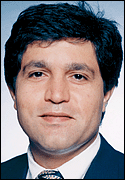

![]()
Pacific Perspective


![]()
Pacific Perspective
Earnings
management
a hot issueIt is hard not to notice the Enron case, given the publicity that it has achieved. Perhaps the auditors are to blame, because they failed to catch problems and then contributed to the problem with document shredding. But perhaps other factors were at work which contributed to this latest earnings management scandal.
Earnings management is not a new topic for either accounting practitioners or researchers. Our U.S. generally accepted accounting principles (gaap) establish a legal basis for managing earnings. Accountants have the ability to choose among sets of accepted methods and are able to use different ways of estimating revenues and expenses based on gaap. So, why do we have such confusing choices? Wouldn't it be better to limit the firms to only one set of reporting principles under gaap?
The underlying reason for having varied choices is that managers are able to choose the method that will best depict the underlying economic conditions of the firm, not the method that will put earnings in their most positive light. In reality, however, some managers do manage earnings with different ends in mind. For example, a 1998 Business Week Poll reported that 12 percent of chief financial officers had managed earnings at the request of their superiors and an additional 55 percent of CFOs said they were asked to do so.
The U.S. corporate focus on short-term results, rather than longer- term decision-making, has created a pressure to mismanage earnings. Some blame gaap's flexibility for misused earnings management. But gaap in and of itself cannot guard against every kind of possible abuse.
This is not just a U.S. issue. In the international setting, accounting methods and standards have been developing through a variety of organizations. Most of the accounting methods suggested mirror gaap. Consequently, accountants at international companies, like their U.S. counterparts, have the authority and capabilities to manage earnings. As a matter of fact, earnings management is used widely in Japan and other Asian countries.
If we want to retain the flexibility necessary for accurate financial reporting, how do we create an environment of ethics and honesty? The other aspects of the financial reporting process -- corporate ethics, culture and tone at the top, risk management and controls, effective audit committee oversight, capable auditing, and public accountability and enforcement -- are essential components that contribute to high-quality information for investors. It is now, more than ever, extremely important that our educational system encourages students to think of ethical issues when making decisions.
Hamid Pourjalali is the director of the school of accounting in the University of Hawaii at Manoa College of Business Administration. Reach him at Hamid@CBA.hawaii.edu.